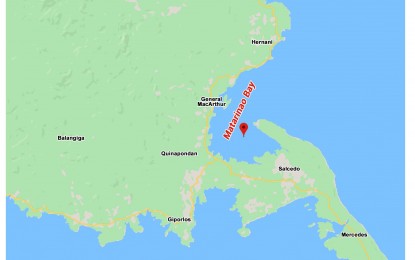
TOXIN. A map showing the location of Matarinao Bay in Eastern Samar. The Bureau of Fisheries and Aquatic Resources (BFAR) is heightening its monitoring in Matarinao Bay in Eastern Samar after laboratory results confirmed that samples collected in the area are positive for paralytic shellfish poisoning. (BFAR Region 8 image)
TACLOBAN CITY – The Bureau of Fisheries and Aquatic Resources (BFAR) is heightening its monitoring in Matarinao Bay in Eastern Samar (Region 8) after laboratory results confirmed samples collected in the area are positive for paralytic shellfish poisoning (PSP).
Even after releasing the result, the bureau has been collecting water and shellfish meat samples weekly to detect the presence of red tide toxins and warn affected communities against gathering, trading, and consumption of shellfish.
“We have been coordinating with local government units and local police to help us implement the shellfish ban in order to safeguard communities,” said Christine Gresola, information officer of the BFAR regional office here.
On Aug. 18, BFAR’s laboratory in this city found the presence of red tide in Matarinao Bay and it was confirmed through further tests by the BFAR main office on Sept. 2, according to Gresola.
The phenomenon has recurred in the bay six months after it was declared toxin-free.
Currently, Matarinao is the only bay in the region positive for red tide.
The bay covers the coastal waters of General MacArthur, Hernani, Quinapondan and Salcedo in Eastern Samar province.
Fish, squid, crab, and shrimp gathered from these areas are safe to eat provided all entrails are removed and washed thoroughly with running water before cooking.
The BFAR asked local government units to heighten their watch against the gathering, trading, and consumption of shellfish and other bivalve marine products to prevent PSP.
PSP occurs from ingesting bivalve shellfish, such as mussels, oysters, and clams with red tide toxins.
Red tide is a term used to describe a phenomenon where a high concentration of algae discolors the water. (PNA)
